I have been conditioned by the world of fiction to regard London as an impregnable fortress. In Skyfall, MI6 could be blown up by terrorists yet keep on working from its underground alternate headquarters, with “M” and “Q” safe and well. Despite its title, in London Has Fallen, with heads of state dropping like flies, the terrorists infiltrating the highest levels of security (three cheers for diversity programmes!), and international terror masterminds owning whole buildings necessary for the take-over plan to function (now that is just wild fantasy fiction isn’t it?) – the good guys prevail (with a little American help).
To get to the stage where you have a militarised police filtering the population with detailed searches, ‘hand-on-heads’ type containment of ‘innocents’ with the appearance of martial law, one must turn to 28 Weeks Later. In that doomsday classic, the UK has undergone a literal ‘zombie apocalypse’ scenario at the hands of the Rage Virus. Even then, London is still the safe haven – albeit militarised – for all the non-flesh-eaters who want a break from the incessant running.
As it turns out, fact is stranger than fiction. All it took for the zombie apocalypse was three Islamics in a van, armed with knives. We’ve all been saturated with the details and statistics of the carnage, we’ve all been subjected to overdoses of the predictable hand-wringing by the political classes and elites, we’ve all seen the news turning a handful of interviews into hours of coverage to the point where we can lip-synch the dialogue. Of all the approved media coverage, the images that sit most starkly in my mind aren’t the ones of people sitting by the curb holding bloodied cloth to their cuts and slashes. I am struck by the actions of police.
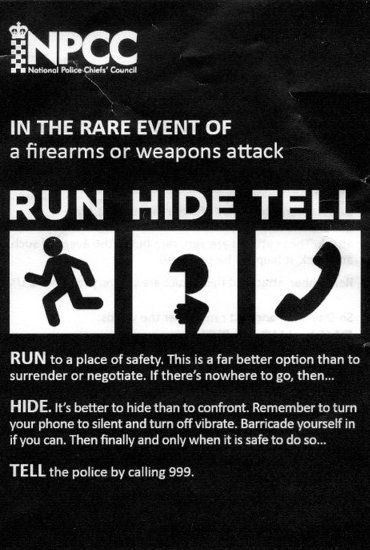
British authorities’ message to its citizens: run, hide and inform.
We were assured after Manchester that the police presence would be truly awesome – they couldn’t guarantee another attack wouldn’t happen, but the public was to be reassured by the show of force. We were told after London Bridge, that within 8 minutes all the terrorists were shot. There was carnage all the same. What I noticed was an unprecedented level of aggression from police towards the general public. People were being ordered to cower under tables – under threat of police action. At one point I saw film of police getting very aggressive with those they termed ‘gawkers’ – not gawking at dead bodies – just wanting to understand the mayhem. Then I saw pictures of Londoners being sent down streets with their hands on their heads as if in a state of martial law.
I understand that in the chaos police didn’t know if they had apprehended all the culprits, that they didn’t know if more attacks were planned, that they had reason to fear that the knife attackers also carried explosives. I understand all of that. However, truth be told – what I saw (not being there of course, and having to appreciate the situation via media reports) was a police force cracking down on its own civilians with a militaristic zeal because it didn’t know what else to do.
I was especially touched by one account from a man who witnessed a girl being stabbed multiple times. He wanted to help her, he looked for a weapon, a chair or table – but everything was ‘bolted down’ and he felt totally helpless. The constant refrain from witnesses was ‘helpless’. The terrorists walked into bars and restaurants and just started stabbing. Some reported throwing pint glasses at the attackers, but despite outnumbering them hundreds to one, despite being attacked with only blades, the public felt helpless and the injury toll mounted. It was police bullets that ended the fray – I can only imagine the toll had the terror had been allowed to carry on for a few more minutes.
Again, truth be told, I can’t imagine three Englishmen walking through Beirut, Baghdad, Tehran or even Constantinople on a stabbing spree and getting very far. In fact, I can’t imagine them even engaging in a swearing fit or ‘racist tirade’ in such cities and avoiding hospitalisation. I imagine that the average Briton would be terrified of standing up in a cafe in Cairo and bellowing obscenities about Mohammed – they would genuinely fear for their very lives. I imagine that an Egyptian Muslim standing up in a London bar and swearing obscenities about Her Majesty or Christ or the English generally, would be met with a stunned silence, a cluster of filming smart phones, perhaps – in the right area – even agreement and applause.
I am not suggesting here that: I’d prefer London be more like a Middle Eastern city, that the English are weak, that the London attack lacked the presence of local heroes or even that I’d fare any better in the same position as most of the witnesses. All I note is that for some reason, which I won’t be attempting to analyse or even diagnose here, the average Englishman feels helpless in ways that I (and most of you if you’ll be honest with yourselves) don’t see in many other parts of the world. He feels helpless in ways that we can’t imagine our fathers or grand-fathers feeling helpless. This is all very anecdotal, somewhat emotional, and perhaps even tinged with idealism and nostalgia – but instinctively, we all know there’s something to it. This idea that I am grasping at like a blind man in fog is the same one many others know is out there and are challenged to describe too.
When I see the reaction of the police and security forces towards the English people, all I see is the underscoring of this sense of helplessness. I recall the words of Roger Scuton, who writes in his ‘eulogy’ for England:
“The police force was not an arm of the central government, but a local organisation, responsive to the county councils. The ‘bobby’ himself was trained as a friend of the community he served, and the sign of this was that he was armed only with a notebook and a comic tin whistle. he knew the people on his beat, and took a benign and paternal interest in their welfare. Children went to him when they were lost; strangers asked him directions, and everybody greeted him with a smile.”1

Roger Scruton, conservative English philosopher and author.
Earlier, Scruton notes that:
“[w]hen a felon transgressed it was not the state but the law which pursued him, and the essential goodness of the law was symbolised by the fact that policemen carried no arms. Policemen were chosen for their height, with hats that emphasised their superior stature. But they were representatives of authority, not power – the authority of a law that stood above all earthly powers and could never be reduced by them. In popular films the police confronted gun toting criminals with the same phlegmatic confidence as radiated from those idealised schoolroom portraits of General Gordon of Khartoum, in which the General faced the spears of savages with a calm acceptance of his fate, as safe and unflustered in death as he would have been on the thickly carpeted stairwell of his London club, conscious that his authority was only enhanced by his lack of power and that one day, thanks to his quiet sacrifice, order would be reimposed.”2
I am not sure I see either of these images when I scrutinise those I receive filtered through the media. It would seem that a generation of diversity programmes, heterogenising of community and state centralisation, has produced a different effect. The image of General Gordon remains apt – because now it would appear that the Mahdi’s troops are on the rampage.
I can’t help but think that the response to theses attacks; pink balloons, flowers and candle vigils, and a rock concert – won’t be the magic panacea everyone is hoping for. Rather it will entrench whatever this phenomenon is that is turning the stiff upper lip into a quivering one. The Englishman is increasingly looking confused and helpless, he is looking brow-beaten by those the State assigns to protect him, he is looking the way I imagine the souls of Airstrip One to look.
What frightens me the most, outside of the immediate carnage, is the erasure I detect of the quintessentially English character that I know and love. It flows within my veins, it is the stuff of my ancestry. I do not want to become an eccentric repository of it because I am cast to the antipodes, shielded by the prophylaxis of distance.
Just because the buildings still stand, it doesn’t mean that London hasn’t fallen. She is truly slain when General Gordon sits rocking on the third step, weeping and confused, not knowing what to do.
– Luke Torrisi is a retired legal practitioner and now an academic researcher and host of Carpe Dieum, Sydney’s only explicitly Traditionalist and Paleoconservative radio programme on 88.9FM, between 8:00 to 10:00pm, Mondays.
Endnotes:
- Roger Scruton, England: An Elegy (London: Pimlico, 2001) pp. 120-121.
- Ibid. at p. 56.
Post Scriptum:
Since writing this earlier today – the news headlines (here at least) run with ‘heroes emerge from the London terror attack’ and it just convinces me more than Scruton’s Eulogy is wise. There was a police officer who took on all three terrorists with just a baton – and was wounded extensively. He actually is a hero. Unfortunately the word is being abused when applied to many others. There was a Romanian baker who clobbered one of them with a basket – that takes a fair bit of guts and genuine bravery – but again, the twitter-verse comes alive as he is exalted as a ‘migrant hero’ who might be thrown out because of Brexit! As for those who are heroes because they called out to warn people, gave someone a bandage, asked a person if they were okay … that just shows a deformed view of what a hero actually is. I note one ‘hero’ applied a tourniquet to a person caught by a bullet in the crossfire … seems that the wounded weren’t all victims of terrorists. – L.T., 4:05pm.
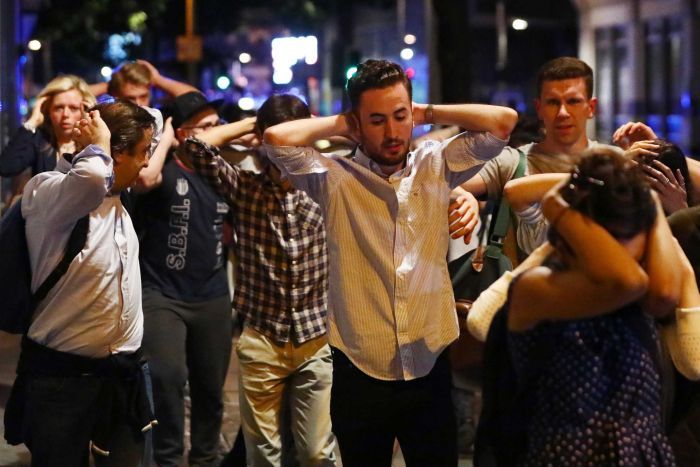
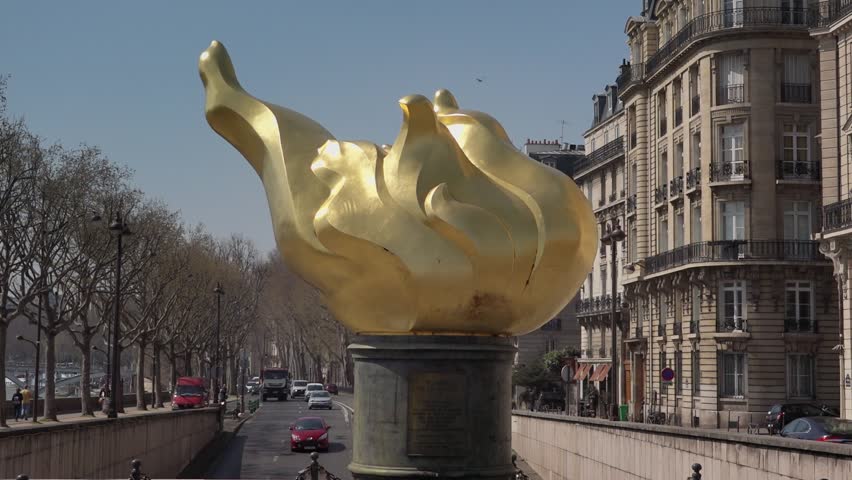
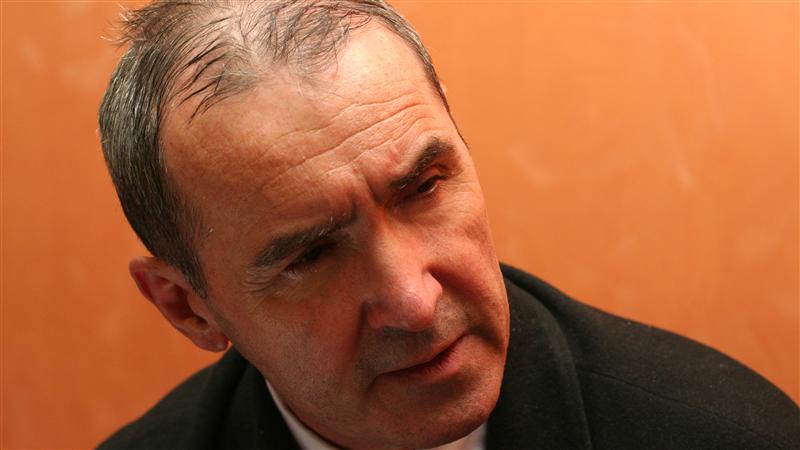

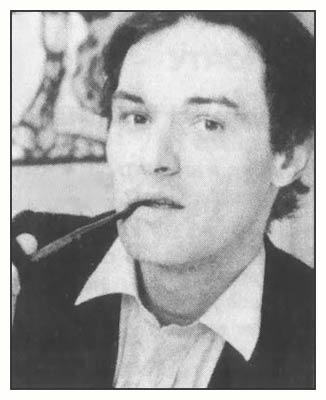
I guess an average western citizen isn’t aware of his country’s role in middle east, so when attacks like this which are the only natural consequence of your policies happen they seem like senseless crimes of insane people.
For the last 100 years or so every western power has been on the side of evil in middle east, in every conflict, every war and every event you have taken the side of the wrong party. One of these mistakes is the support you have provided to the Sunni Jihad against my people, which is directly responsible for almost every terrorist attack ever done in the west. Without your support these incompetent elements would’ve been destroyed a long time ago.
This is your Frankenstein’a monster, it has been genociding my people in Yemen, Syria, Iraq, Bahrain, Pakistan and Saudi occupied Arabia with direct, constant and unrepentant western support.
Now after the second war you began preaching the absolute equality of all things, this becane the central ideal upon which all of your social institutions were built, so accepting defeat and declaring a group of people unfit for civilized coexistence would mean letting go of your civilization’s central theme, your society as you know it will collapse, and what comes next will be more similar to an Islamic state than to what you have right now.
Our anonymous correspondent raises some interesting points, however, like our detractors among the 白左, he too makes the same error in (a) equating our politics with the neoliberal imperialism of the trans-nationalists in Washington and Brussels, and (b) believing that the moral and spiritual chaos in which Western societies are embroiled is part of our “civilisation”.
On even a cursory investigation of our content, one would surely conclude that we do not endorse the militant export of liberalism or the “invade the world, invite the world” ideology of the status quo. Paleoconservative statesmen such as Pat Buchanan have been on record for years arguing that Islamist terrorism is a form of blow-back from the failed foreign policies of Western liberal elites. Similar criticisms can be found in the work of Prof. Paul E. Gottfried and the late Lawrence Auster, all men who we hold in high regard.
This does not, however, either excuse or justify the actions of those responsible for the recent Manchester and London attacks. Our general position would be broadly inline with the late Jonathan Bowden, who while acknowledging that being a Muslim is merely “another way of being human”, it is not our way, and has no place in our polis. That, we believe, is quite simply axiomatic. Thus the conflict between the Shia and Sunni sects of Islam are of no interest to us, beyond its historical curiosity, or beyond what it might teach us in the field of perennialist inquiry.
Lastly, our correspondent’s concluding paragraph contains a string of non sequiturs based on unmitigated nonsense. The “central idea” on which Occidental civilisation is based is not the “equality of all things” but the search for Truth (i.e.: achieving a better understanding of the Logos) through the pursuit of beauty and science. Respect for transcendent hierarchy – and therefore the acknowledgment of inequality in the City of Man – is inherent in a worldview that this “central idea” generates.
Secular egalitarianism, utilitarianism, materialism, humanism, radical individualism, and the reductionist nihilist ideologies of the twentieth century, these are all the product of a Revolutionary spirit that has toppled Throne and Altar and is now in the process of erasing Man’s particularist qualities. This is being achieved through the promotion of extreme forms of subscription identity and the elevation of so-called “gender theory” to the position of official régime dogma.
This Revolutionary spirit has lead to an enervated populace and the natural auto-erasure that follows it. Western societies have therefore abdicated their patrimony and the consequences can be seen in the major capitals of Western Europe and the United States. The vacuum created will arguably be filled by savagery, but whether that savagery will be of an Islamic flavour is debatable. What is not debatable is that contemporary degeneracy is certainly not exemplary of Western “civilisation”; it is symptomatic of a people in decay.
What idiocrats in the West celebrate under the banner of “values” is often, ironically, a contradiction or negation of what was once called Christendom. It has been the mission of the Sydney Traditionalist Forum to get at the root of that decay and allow a younger vanguard to arrest and reverse its morbid trends in their own lives and the soul of their immediate communities. Our diametric opposition to post-modernist pathologies forms part of our raison d’être.
At the same time, we are not oblivious to the dynamic battle map of Dr. William Warner, and we cannot accept any religio-ideology that refuses to incorporate the doctrine of Imago Dei within its own worldview.
Whether unquarantimed co-existence with Islam will ever be possible, whether the Hashemite heresy’s thirst for conquest will ever be sated, and whether there was ever a “right side” to support in the Middle East conflict, these are open questions that others may wish to answer, in their own time, and on their own publishing platforms.
Good work Luke – I have commented and linked this on today’s blog post [link].
As Chateaubriand noted in the 18th century: “Men don’t allow themselves to be killed for their interests; they allow themselves to be killed for their passions.”
Great stuff, I commented & quoted it here: [link]